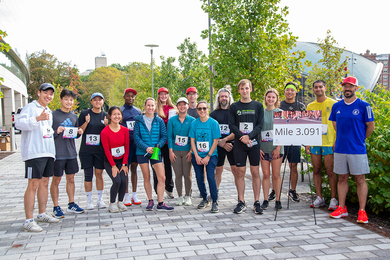Walter E. Morrow, a pioneering electrical engineer and the director of MIT Lincoln Laboratory from April 1977 to June 1998, passed away on Sunday, Feb. 12, at his home in Weston, Massachusetts. He was 88 years old.
Morrow ’49, SM ’51 began his career at Lincoln Laboratory after his 1951 graduation from MIT with degrees in electrical engineering. He joined the laboratory’s Long Range Communications Group, where his early research and development work was in ionospheric and tropospheric beyond-the-horizon communication techniques. As leader of the Systems Engineering Group from 1955 to 1964, he designed and directed Project West Ford, a series of experiments that demonstrated the feasibility of using orbiting thin-wire reflectors to support long-range, high-frequency radio transmissions. For this work, Morrow received an MIT Outstanding Achievement Award that cited his “imaginative contribution to a new concept of intercontinental microwave communication.”
Throughout his career, Morrow was a pioneer in the development of advanced satellite communication systems for the U.S. military. Under his leadership and through his collaborations with staff and sponsors, the Laboratory’s Lincoln Experimental Satellite program developed a wide range of critically important technologies. Much of this technology continues to be central to military satellite communication systems used by the United States and its allies.
Morrow helped to guide Lincoln Laboratory’s expansion into new areas of research and development. In 1969, while assistant director, he led a study group that investigated the possibility of establishing a major air traffic control program at the laboratory. Because of his recommendation to move forward, the laboratory created and has sustained a strong air traffic control program that has developed many important weather forecasting and aircraft safety systems over the past 36 years.
Morrow also had the foresight to initiate the South Laboratory and Microelectronics Laboratory building projects. Both projects resulted in major improvements in Lincoln Laboratory facilities, and the upgraded prototyping and technology development spaces had a major impact on the success of programs at the laboratory.
Morrow served on the Defense Science Board as a member from 1987 to 2002 and as a senior fellow from 2002 to 2009, contributing to dozens of task forces in areas such as space superiority, advanced semiconductors, homeland protection, and air defense. Morrow was a member of the Chief of Naval Operations Executive Panel for 37 years, the Naval War College Board of Advisors, the Air Force Scientific Advisory Board, and NASA's Advisory Council.
During his distinguished career, Morrow received numerous awards, including the Department of Defense Medal for Distinguished Public Service in 1998, the Department of Defense Outstanding Public Service Award in 2010, and the Navy Superior Public Service Award in 2015. He was elevated to the level of fellow in the Institute of Electrical and Electronics Engineers (IEEE) in 1966 and was elected a member of the National Academy of Engineering in 1978.
Through his example, Morrow promoted an exceptional level of technical excellence and integrity, and left a profound impact on Lincoln Laboratory and many programs for our nation’s defense.
Morrow was married for 65 years to the late Janice (Lombard) Morrow and is survived by his sons Clifford and Gregory Morrow, his daughter Carolyn Morrow, two grandsons, and a great-grandson. Information on visiting hours and a memorial service on Friday, Feb. 17, can be found at the Brasco and Sons website.







